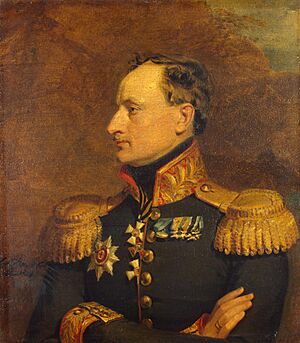Konstantin von Benckendorff facts for kids

Konstantin von Benckendorff (born January 31, 1785 – died August 6, 1828) was an important general and diplomat from the Russian Empire. He was part of a Baltic German family. He served his country both in the army and in foreign affairs.
Life and Military Service
Konstantin was born in Saint Petersburg. His family was part of the Baltic nobility in Russia. His father, Christoph von Benckendorff, was a general. He was also the military governor of Livonia. His mother, Anna Schilling von Canstatt, was a close friend of Empress Maria Fyodorovna.
Konstantin had a famous brother, Alexander von Benckendorff. Alexander was also a general and a statesman. His sister, Dorothea von Lieven, was a well-known political figure. She was active in London, St. Petersburg, and Paris.
Konstantin first trained to be a diplomat. However, he joined the army during the final years of the Napoleonic Wars. He helped capture several cities. These included Kassel, Fulda, Hanau, Reims, and Soissons.
After the wars ended, Benckendorff went back to working as a diplomat. Five years later, he became a special representative. He worked in Baden and Stuttgart.
When the Russo-Persian War began, he returned to Russia. He helped capture Echmiadzin. He also defeated Kurdish forces near Erivan. Later, he crossed the Araks River and defeated the Persian cavalry.
Benckendorff sadly died from a fever. This fever spread through the Russian army. It happened at the start of the Russo-Turkish War, 1828–1829.
Family Life
Konstantin married Natalia von Alopaeus on September 1, 1814. She was the daughter of Count Maximilian Magnus von Alopaeus. Konstantin and Natalia had two children together:
- Count Konstantin Alexander von Benckendorff (born 1816 – died 1858). He married Princess Louise von Croy.
- Countess Marie von Benckendorff (born 1818 – died 1844). She married Prince Pavel Matveyevich Golenischev-Kutuzov-Tolstoy.
Awards and Recognition
Konstantin von Benckendorff received many awards for his service. These honors showed his bravery and dedication. Some of his important awards included:
- Order of St. Anna (2nd class with diamonds in 1812, 1st class in 1823, and diamonds added to 1st class in 1824)
- Order of St. George (4th class in 1813, 3rd class in 1815)
- Order of St. Vladimir (4th class in 1812, 3rd class in 1813, 2nd class in 1827)
- Order of the Red Eagle, 2nd class (from Prussia)
- Knight First Class of the Order of the Sword (from Sweden)
- Knight of the Military Order of Max Joseph (from Bavaria)
- Imperial Order of Leopold (from Austria)
- Golden Sword with the inscription "For Bravery", with diamonds (received twice, in 1814 and 1828)
- Silver medal "In memory of the War of 1812"
 | Delilah Pierce |
 | Gordon Parks |
 | Augusta Savage |
 | Charles Ethan Porter |

